
The Iran–Contra affair, often referred to as the Iran–Contra scandal and more rarely as the Iran Initiative, was a political scandal in the United States that occurred during the second term of the Reagan administration. Between 1981 and 1986, senior administration officials secretly facilitated the illegal sale of arms to Iran, which was subject to an arms embargo at the time. The administration hoped to use the proceeds of the arms sale to fund the Contras, an anti-Sandinista rebel group in Nicaragua. Under the Boland Amendment, further funding of the Contras by legislative appropriations was prohibited by Congress, but the Reagan administration figured out a loophole by secretively using non-appropriated funds instead.
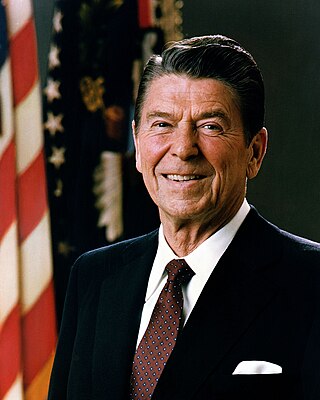
Ronald Wilson Reagan was an American politician and actor who served as the 40th president of the United States from 1981 to 1989. A member of the Republican Party, he became an important figure in the American conservative movement, and his presidency is known as the Reagan era.

The 1980 United States presidential election was the 49th quadrennial presidential election, held on November 4, 1980. The Republican nominee, former California governor Ronald Reagan, defeated incumbent Democratic President Jimmy Carter in a landslide victory. This was the first election since 1932 in which an elected incumbent president was defeated, as well as the first election since 1888 that saw the defeat of an incumbent Democratic president.
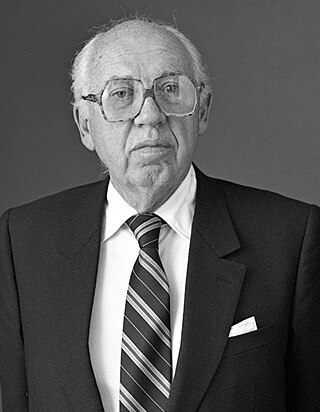
William Joseph Casey was an American lawyer who was the Director of Central Intelligence from 1981 to 1987. In this capacity he oversaw the entire United States Intelligence Community and personally directed the Central Intelligence Agency (CIA).

The Iran hostage crisis was a diplomatic standoff between Iran and the United States. Fifty-three American diplomats and citizens were held hostage in Iran after a group of armed Iranian college students belonging to the Muslim Student Followers of the Imam's Line, who supported the Iranian Revolution, including Hossein Dehghan, Mohammad Ali Jafari and Mohammad Bagheri, took over the U.S. Embassy in Tehran and took them as hostages. The hostages were held for 444 days, from November 4, 1979 to their release on January 20, 1981. The crisis is considered a pivotal episode in the history of Iran–United States relations.
Gary G. Sick is an American academic and analyst of Middle East affairs, with special expertise on Iran, who served on the U.S. National Security Council under Presidents Ford, Carter, and for a couple weeks under Reagan as well. He has authored three books, and is perhaps best known to the wider public for voicing support for elements of the 1980 October Surprise theory regarding the Iran hostage crisis and that year's presidential election.
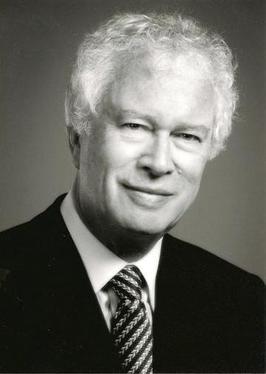
Kenneth Douglas Taylor was a Canadian diplomat, educator and businessman, best known for his role in the 1979 covert operation called the "Canadian Caper" when he was the Canadian ambassador to Iran. With the cooperation of the American Central Intelligence Agency, Taylor helped six Americans escape from Iran during the Iran hostage crisis by procuring Canadian passports for the Americans to deceive the Iranian Revolutionary guard by posing as a Canadian film crew scouting locations. Had the IRG known, every Canadian in the embassy would have been executed. Before the escape, the six Americans spent several weeks hiding in the homes of Taylor and another Canadian diplomat, John Sheardown.

Ronald Reagan's tenure as the 40th president of the United States began with his first inauguration on January 20, 1981, and ended on January 20, 1989. Reagan, a Republican from California, took office following his landslide victory over Democrat incumbent president Jimmy Carter and independent congressman John B. Anderson in the 1980 presidential election. Four years later, in the 1984 presidential election, he defeated former Democratic vice president Walter Mondale, to win re-election in a larger landslide. Reagan was succeeded by his vice president, George H. W. Bush, who won the 1988 presidential election. Reagan's 1980 landslide election resulted from a dramatic conservative shift to the right in American politics, including a loss of confidence in liberal, New Deal, and Great Society programs and priorities that had dominated the national agenda since the 1930s.
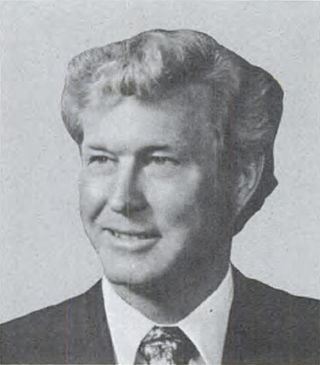
Donald Joseph Albosta was an American farmer, businessman, and politician from the U.S. state of Michigan. He served three terms in the United States House of Representatives from 1979 to 1985.
The 1980 October Surprise theory refers to an allegation that representatives of Ronald Reagan's presidential campaign made a secret deal with Iranian leaders to delay the release of American hostages until after the election between Reagan and President Jimmy Carter, the incumbent. The detention of 66 Americans in Iran, held hostage since November 4, 1979, was one of the leading national issues during 1980, and the alleged goal of the deal was to thwart Carter from pulling off an "October surprise". Reagan won the election, and on the day of his inauguration—minutes after he concluded his 20-minute inaugural address—the Islamic Republic of Iran announced the release of the hostages.
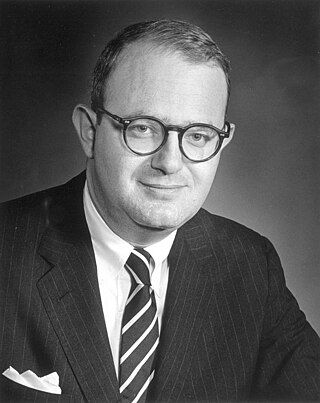
Laurence Hirsch Silberman was an American jurist and diplomat who served as a United States circuit judge of the United States Court of Appeals for the District of Columbia Circuit from 1985 until his death. He was appointed in October 1985 by President Ronald Reagan and took senior status on November 1, 2000. On June 11, 2008, President George W. Bush awarded Silberman the Presidential Medal of Freedom.
Blowback is the unintended consequences and unwanted side-effects of a covert operation. To the civilians suffering the blowback of covert operations, the effect typically manifests itself as "random" acts of political violence without a discernible, direct cause; because the public—in whose name the intelligence agency acted—are unaware of the effected secret attacks that provoked revenge (counter-attack) against them.
In the politics of the United States, an October surprise is a news event that may influence the outcome of an upcoming November election, whether deliberately planned or spontaneously occurring. Because the date for national elections is in early November, events that take place in October have greater potential to influence the decisions of prospective voters and allow less time to take remedial action; thus, relatively last-minute news stories could either change the course of an election or reinforce the inevitable. The term "October surprise" was coined by William Casey when he served as campaign manager of Ronald Reagan's 1980 presidential campaign; however, there were October election-upending events that predated the coining of the term.

United States support for Ba'athist Iraq during the Iran–Iraq War, in which it fought against post-revolutionary Iran, included several billion dollars' worth of economic aid, the sale of dual-use technology, military intelligence, and special operations training. The U.S. refused to sell arms to Iraq directly due to Iraq's ties to Palestinian groups which the U.S. designates as terrorist organizations such as the Palestinian Liberation Front and Abu Nidal Organization, but several sales of "dual-use" technology have been documented; notably, Iraq purchased 45 Bell helicopters for $200 million in 1985. Of particular interest for contemporary Iran–United States relations are accusations that the U.S. government actively encouraged Iraqi leader Saddam Hussein to invade Iran, supported by a considerable amount of circumstantial evidence and generally regarded as the conventional wisdom in the Arab world, but several scholars and former U.S. government officials deny that any such collusion occurred, and no direct documentary proof of it has been found.
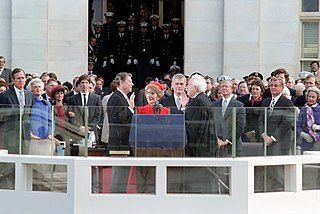
The first inauguration of Ronald Reagan as the 40th president of the United States was held on Tuesday, January 20, 1981, at the West Front of the United States Capitol in Washington, D.C. This was the first inauguration to be held on the building's west side. This was the 49th inauguration and marked the commencement of Ronald Reagan's and George H. W. Bush's first term as president and vice president, respectively. Chief Justice Warren E. Burger administered the presidential oath of office to Reagan, who placed his hand upon a family Bible given to him by his mother, open to 2 Chronicles 7:14. Associate Justice Potter Stewart administered the vice presidential oath to Bush.

The Iran hostage crisis negotiations were negotiations in 1980 and 1981 between the United States Government and the Iranian Government to end the Iranian hostage crisis. The 52 American hostages, seized from the US Embassy in Tehran in November 1979, were finally released on 20 January 1981. A detailed account of the hostage crisis and the Algiers Accords is found in American Hostages In Iran: The Conduct of a Crisis [Yale 1985] put together by the Council on Foreign Relations.
Arif Ali Durrani is a Pakistani businessman who has twice been convicted by US courts of selling arms to Iran.

Public Law 113-110 is a law that "ban(s) Iran's new United Nations ambassador, who has ties to a terrorist group, from entering the United States." Iran's proposed ambassador, Hamid Aboutalebi, is controversial due to his involvement in the Iran hostage crisis, in which a number of American diplomats from the US embassy in Tehran were held captive from 1979 until 1981. Aboutalebi said he did not participate in the takeover of the US embassy, but was brought in to translate and negotiate following the occupation. President Barack Obama told Iran that Aboutalebis selection was not "viable" and Congress reacted by passing this law to ban his presence in the United States.

The 1980 United States presidential election in Kansas took place on November 4, 1980. All 50 states and The District of Columbia were part of the 1980 United States presidential election. State voters chose seven electors to the Electoral College, who voted for president and vice president.

This is a timeline of the Iran hostage crisis (1979–1981), starting from the Shah Mohammed Reza Pahlavi's leaving of Iran and ending at the return of all hostages to the United States.












